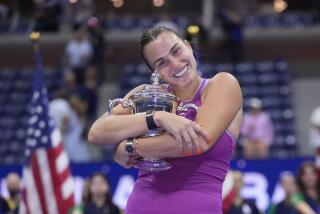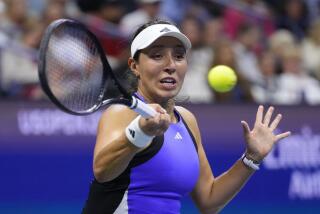Sharapova Wins, but Signals Get Crossed
- Share via
NEW YORK — Maria full of grace? This was more like Maria-in-your-face at the U.S. Open on Saturday night.
From her first penetrating winner to her progressively louder shrieking to a bizarrely combative post-match news conference, 19-year-old Maria Sharapova refused to give an inch on her way to winning her second Grand Slam singles title.
Not against Justine Henin-Hardenne, who had defeated her four times, including twice this year. And certainly not to reporters who dared to raise the question of assistance from the stands from her touring coach Michael Joyce after she defeated Henin-Hardenne, 6-4, 6-4, in the final.
“Let’s make this a positive session tonight -- please, por favor,” she said, edgily, sitting down in her chair.
No wonder she was confused. The sycophantic air applause when she walked in the interview room quickly disappeared when the topic of Joyce came up. It became an issue when CBS showed footage of Joyce holding up four fingers during a changeover.
The four could mean anything. Forehand? Of course, anyone in the arena would know that it might be a good idea to steer away from Henin-Hardenne’s backhand. Sharapova took umbrage.
“I thought this was supposed to be a positive interview,” Sharapova said. “I just won a Grand Slam. The last thing I’m gonna talk about is some fingers or a banana, right? I hope you got that one, thanks.”
Instead of neatly defusing the issue, Sharapova dug herself in deeper when she engaged in a long back-and-forth with another reporter, who asked about the signals, wondering about the no-coaching rule and the issue of fairness in competition.
“Can you tell me, if someone tells me to eat a banana, do you think that’s the reason I’m gonna win a match?” she asked. “Just give me your honest opinion ... Just take the rules away, take the books away, just -- just think.”
Sharapova’s camp later went into damage control. Her father, Yuri, who rarely gives interviews and refused to do so before her post-match blowup, spoke with reporters. Her agent, Max Eisenbud of IMG, said the four fingers meant four drinks, that the teenager gets so focused she often forgets to eat a banana or drink her sports beverages.
So, why not say this in a room full of reporters? Eisenbud said she had been “near tears” in the morning about a column in the New York Times, which they felt depicted the 19-year-old as a puppet, with Yuri, and Joyce, pulling strings from the stands.
Which, unfortunately for Sharapova, led to the verbal slip on the banana peel.
Banana-gate, strangely, threatened to overshadow a terrific performance and improved court coverage from Sharapova, who had not won a Slam since breaking through at Wimbledon two years ago at 17. How unusual was it that Henin-Hardenne, who became the first player since 1997 to reach all four Slam finals in the same year, found herself on the outside of a controversial situation?
“I couldn’t play that aggressive,” Henin-Hardenne said. “She had a lot of time, and she was going for winners. She did come to the net. I didn’t. So she’s been brave tonight, and more than me. That made a big difference.”
The only nerves Sharapova showed came early, when she was broken in the second game. Henin-Hardenne would never get another break-point chance.
“She’s always been working and been pretty consistent and she’s been giving herself a chance to get to the semis of the Grand Slams and we all knew she could break through sooner or later,” said Joyce, who added that her victory at La Costa in August boosted her confidence.
“She felt a little pressure because people were talking that she hadn’t won another Slam, but she was there all the time. It was just a matter of time.”
Sharapova won it on her first match point when Henin-Hardenne netted a forehand.
Sharapova dropped her racket and dropped to her knees. Giddy, she made her way to the players’ box and hugged her entourage. Her only miscue came when she dropped the top of the trophy in her excitement.
“I thought to myself the second that happened, I was like, ‘That’s typical, Maria. Typical.’ I knew. There’s always something that’s gonna happen,” she said.
Her never-give-an-inch philosophy surfaced when asked about the $1.7 million in prize money she would take home, $1.2 million for the Open and $500,000 for the Open Series bonus.
“That’s another thing that I’m not gonna get into it right now,” she said. “But winning, you can’t buy a Grand Slam title, you know? You can’t buy it. There are people around the world that have billions of dollars, but no matter how much they want a U.S. Open title.
“The only thing they can do is buy some good tennis racquets, get the best trainers out there, and work their butt off.”
More to Read
Go beyond the scoreboard
Get the latest on L.A.'s teams in the daily Sports Report newsletter.
You may occasionally receive promotional content from the Los Angeles Times.











